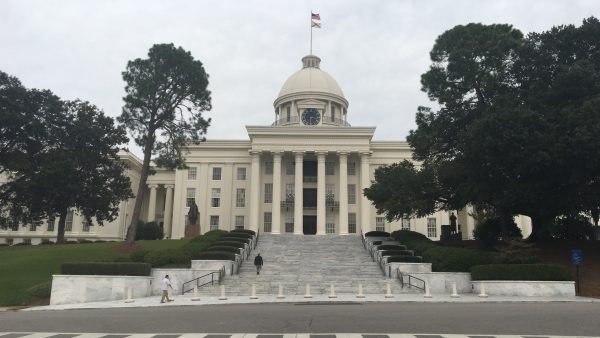Alabama Lawmakers Return To Pass Budgets After Extended Coronavirus Break
Alabama lawmakers go back to Montgomery Monday, leaving them just two weeks to wrap up the legislative session after the coronavirus pandemic prompted an extra-long spring break. With the time left, Republican leaders plan to focus primarily on the state’s budgets. That’s tricky, as the economic fallout from the outbreak is still unfolding.
The legislature’s first attempt at charting a fiscal course through the coronavirus era came Tuesday, in the Senate’s General Fund budget committee. Lawmakers sat apart from each other, with some wearing face masks. The committee’s chairman, Republican Senator Greg Albritton, said things look different now than when the session started in February.
“We are now caught in a vortex of significant financial changes with little time to analyze and plan,” Albritton said.
Despite the economic uncertainty, the $2.4 billion dollar General Fund budget passed the committee. It’s $167 million larger than the current budget, although it’s still less than what Governor Kay Ivey suggested before the pandemic. Most agencies are level-funded. Raises for state workers and teachers probably won’t happen, but the budget does increase funding for Medicaid, the Department of Public Health, the Department of Mental Health and the prison system.
“There’s going to be no danger of any kind of proration in the General Fund budget this year,” Albritton said.
Proration is across-the-board cuts when money comes up short. Albritton said that revenue has been coming in above projections and some agencies have unused money.
Republican Senator Arthur Orr chairs the Senate committee overseeing the education budget. He wasn’t overly concerned either.
“Will we see decreases in revenue? Yes,” Orr said. “But it’s not an extreme cause for alarm.”
Orr said state coffers will look really bad initially because the deadline for filing income tax returns has been pushed back until July 15th. The education budget depends largely on income and sales tax, meaning it’s more susceptible to downturns, but Orr said he expects level funding for education, maybe a little more, because there are hundreds of millions of dollars in reserves. Officials could also tap into a fund for technology and capital projects that’s been allocated, but not spent yet.
“That would certainly be a buffer for any calamities that may be coming our way,” Orr said.
Orr said lawmakers should pass the budgets on schedule to give schools and state agencies time to plan. Not all lawmakers agree.
“It’s totally irresponsible and it’s not good public policy,” Democratic Representative Anthony Daniels said. He’s the House minority leader.
Daniels said there is not a clear enough picture of the virus’ impact on tax revenue. He said many businesses shut their doors because of COVID-19, plus there’s that delay with income taxes. Daniels would prefer passing the budget in a special session later this summer after more numbers come in. He said Republicans’ financial outlook is too rosey and adjustments will have to be made anyway.
“It’s just a lot of unknowns, a lot of questions, but not a whole lot of answers,” Daniels said.
Lawmakers are required to finish by May 18th. It’s an end to the session few legislators probably imagined when they first met three months ago.
In Berlin, there are movies, there’s politics and there’s talk about it all
Buzz around whether the city's film festival would take a stance on the war in Gaza has dominated conversation in recent days.
Alex Ferreira wins 10th gold medal for Team USA, matching America’s highest total in Winter Olympics
Freeskier Alex Ferreira clinches a tenth gold medal for the U.S. in these Games, tying the U.S.'s all-time record for gold medals in a Winter Olympics.
Trump calls SCOTUS tariffs decision ‘deeply disappointing’ and lays out path forward
President Trump claimed the justices opposing his position were acting because of partisanship, though three of those ruling against his tariffs were appointed by Republican presidents.
The U.S. men’s hockey team to face Slovakia for a spot in an Olympic gold medal match
After an overtime nailbiter in the quarterfinals, the Americans return to the ice Friday in Milan to face the upstart Slovakia for a chance to play Canada in Sunday's Olympic gold medal game.
NASA eyes March 6 to launch 4 astronauts to the moon on Artemis II mission
The four astronauts heading to the moon for the lunar fly-by are the first humans to venture there since 1972. The ten-day mission will travel more than 600,000 miles.
Skis? Check. Poles? Check. Knitting needles? Naturally
A number of Olympic athletes have turned to knitting during the heat of the Games, including Ben Ogden, who this week became the most decorated American male Olympic cross-country skier.








